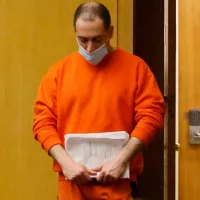
HaizhanZheng/iStock(MINNEAPOLIS, Minn.) — A Minnesota doctor is calling on healthcare workers and people who have tested positive for COVID-19 and are showing early symptoms of infection to participate in two of the first trials of the malaria drug Hydroxychloroquine to treat coronavirus patients.
Dr. David Boulware, an infectious disease specialist from the University of Minnesota, is one of the first doctors to receive approval from the Food & Drug Administration (FDA) to conduct a pair of clinical trials of the drug, which has been heavily promoted by President Trump as a potential antidote to the outbreak.
The first trial will be comprised primarily of healthcare workers and others with a high risk of exposure to the virus, while the second will be open to the general public who have already tested positive for COVID-19. Hydroxychloroquine is being studied both as a way to prevent COVID-19 infection as well as a way to treat people who are already sick.
But one of his biggest problems? He needs volunteers, and lots of them. Boulware is seeking 1500 volunteers for the first trial, but in the week since he obtained FDA approval, he has managed to recruit only 411. Recruitment for the second trial, which is also seeking 1500 volunteers, is going even slower. As of this writing, he has only 25.
Recruitment of participants for clinical trials is typically slow, as participation can be a burdensome process, but the speed of the outbreak and the promotion of the drug at the highest levels of government have raised the stakes for Boulware and his researchers.
“With all the excitement about the Hydroxychloroquine, there’s no actual data that it makes any clinical benefit in actual humans,” Boulware told ABC News. “We’re going to test whether it reduces the severity of symptoms, reduces hospitalizations, and severity and duration of illness to see – Does the drug actually work? And is it safe?”
Researchers will send some participants Hydroxychloroquine (and others a placebo) in the mail and monitor their progress remotely through daily questionnaires.
According to Boulware, healthcare workers and others with a high risk of exposure to the virus, as well as anyone who has recently tested positive (within four days of the test), can learn more about the trials by emailing covid19@umn.edu.
In the meantime, experts are stressing patience as researchers determine whether the drug is safe and effective. Some leaders desperate for a treatment for those infected, however, have not adopted that cautious tone.
In a press conference last week, President Donald Trump said that he had a good “feeling” about the use of Hydroxychloroquine as treatment for coronavirus. At the time of that statement, however, the only data doctors had been looking at was a study of 20 patients with Coronavirus in France.
President Trump later tweeted, “HYDROXYCHLOROQUINE & AZITHROMYCIN, taken together, have a real chance to be one of the biggest game changers in the history of medicine.”
But several doctors, including Boulware, are warning that people should not try this drug on their own, as reports of overdoses, and people self-medicating, have begun to arise.
Following Trump’s praise of the drug’s potential, one Arizona man died and his wife hospitalized after the couple ingested a fish tank cleaning substance that contained chloroquine phosphate. Two people have also reportedly died in Nigeria as a result of chloroquine poisoning.
“Overdoses are possible,” he told ABC News. “Knowing the correct dose is important.”
Dr. Jennifer Ashton, ABC News chief medical correspondent, noted that Hydroxychloroquine is just one drug being tested right now and warned that it carries some potentially serious risks and side effects.
“This is not candy,” Ashton said. “Regular people should not just be taking it. We have no idea if it even works. It’s promising, but needs trials.”
New York State has also started testing the efficacy of the drug, with New York Gov. Andrew Cuomo announcing on Monday that New York State has acquired 750,000 doses of chloroquine, 70,000 doses of hydroxychloroquine and 10,000 doses of Zithromax for its own trial.
As his trials begin, Boulware and his team remain cautiously optimistic about hydroxychloroquine’s potential.
“We should have answers to these questions within three to four weeks,” Boulware said.
Copyright © 2020, ABC Audio. All rights reserved.















